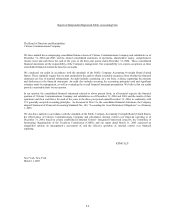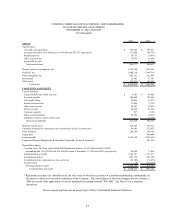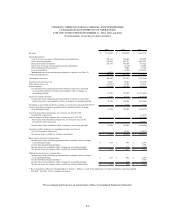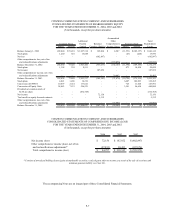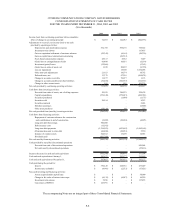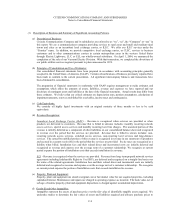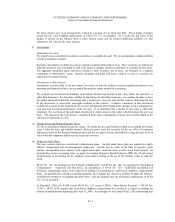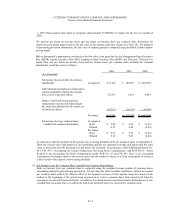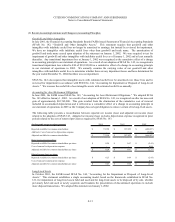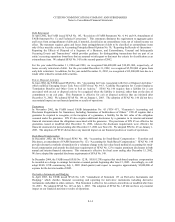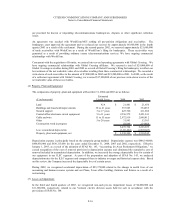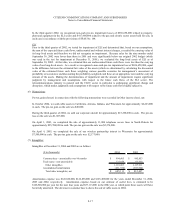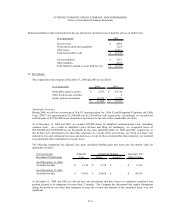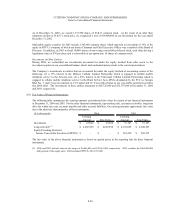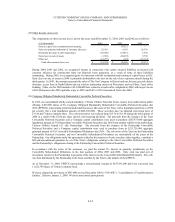Frontier Communications 2004 Annual Report Download - page 58
Download and view the complete annual report
Please find page 58 of the 2004 Frontier Communications annual report below. You can navigate through the pages in the report by either clicking on the pages listed below, or by using the keyword search tool below to find specific information within the annual report.
CITIZENS COMMUNICATIONS COMPANY AND SUBSIDIARIES
Notes to Consolidated Financial Statements
F-14
Debt Retirement
In April 2002, the FASB issued SFAS No. 145, “Rescission of FASB Statements No. 4, 44, and 64, Amendment of
FASB Statement No. 13, and Technical Corrections.” This statement eliminates the requirement to aggregate gains
and losses from extinguishment of debt and, if material, classified as an extraordinary item, net of related income tax
effect. The statement requires gains and losses from extinguishment of debt to be classified as extraordinary items
only if they meet the criteria in Accounting Principles Board Opinion No. 30, “Reporting the Results of Operations –
Reporting the Effects of Disposal of a Segment of a Business, and Extraordinary, Unusual and Infrequently
Occurring Events and Transactions” which provides guidance for distinguishing transactions that are part of an
entity’s recurring operations from those that are unusual or infrequent or that meet the criteria for classification as an
extraordinary item. We adopted SFAS No. 145 in the second quarter of 2002.
For the year ended December 31, 2004 and 2003, we recognized $66,480,000 and $10,851,000, respectively, of
losses on early retirement of debt. For the year ended December 31, 2002, we recognized $5,550,000 of gains from
early debt retirement. In addition, for the year ended December 31, 2002, we recognized a $12,800,000 loss due to a
tender offer related to certain debt securities.
Exit or Disposal Activities
In June 2002, the FASB issued SFAS No. 146, “Accounting for Costs Associated with Exit or Disposal Activities,”
which nullified Emerging Issues Task Force (EITF) Issue No. 94-3, “Liability Recognition for Certain Employee
Termination Benefits and Other Costs to Exit an Activity.” SFAS No. 146 requires that a liability for a cost
associated with an exit or disposal activity be recognized when the liability is incurred, rather than on the date of
commitment to an exit plan. This Statement is effective for exit or disposal activities that are initiated after
December 31, 2002. We adopted SFAS No. 146 on January 1, 2003. The adoption of SFAS No. 146 did not have
any material impact on our financial position or results of operations.
Guarantees
In November 2002, the FASB issued FASB Interpretation No. 45 (“FIN 45”), “Guarantor’s Accounting and
Disclosure Requirements for Guarantees, Including Guarantees of Indebtedness of Others.” FIN 45 requires that a
guarantor be required to recognize, at the inception of a guarantee, a liability for the fair value of the obligation
assumed under the guarantee. FIN 45 also requires additional disclosures by a guarantor in its interim and annual
financial statements about the obligations associated with the guarantee. The provisions of FIN 45 are effective for
guarantees issued or modified after December 31, 2002, whereas the disclosure requirements were effective for
financial statements for period ending after December 15, 2002 (see Note 26). We adopted FIN No. 45 on January 1,
2003. The adoption of FIN 45 did not have any material impact on our financial position or results of operations.
Stock-Based Compensation
In December 2002, the FASB issued SFAS No. 148, “Accounting for Stock-Based Compensation – Transition and
Disclosure, an amendment of FASB Statement No. 123, “Accounting for Stock-Based Compensation.” SFAS No. 148
provides alternative methods of transition for a voluntary change to the fair value based method of accounting for stock-
based compensation and amends the disclosure requirements of SFAS No. 123 to require prominent disclosures in both
annual and interim financial statements. This statement is effective for fiscal years ending after December 15, 2002.
We have adopted the expanded disclosure requirements of SFAS No. 148.
In December 2004, the FASB issued SFAS No. 123R. SFAS 123R requires that stock-based employee compensation
be recorded as a charge to earnings for interim or annual periods beginning after June 15, 2005. Accordingly, we will
adopt SFAS 123R commencing July 1, 2005 (third quarter) and expect to recognize approximately $3,000,000 of
expense for the last six months of 2005.
Derivative Instruments and Hedging
In April 2003, the FASB issued SFAS No. 149, “Amendment of Statement 133 on Derivative Instruments and
Hedging,” which clarifies financial accounting and reporting for derivative instruments including derivative
instruments embedded in other contracts. This Statement is effective for contracts entered into or modified after June
30, 2003. We adopted SFAS No. 149 on July 1, 2003. The adoption of SFAS No. 149 did not have any material
impact on our financial position or results of operations.


